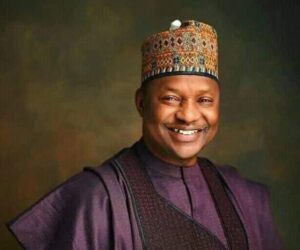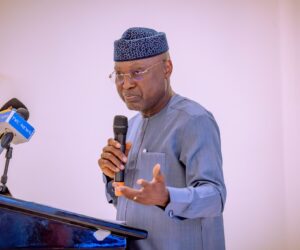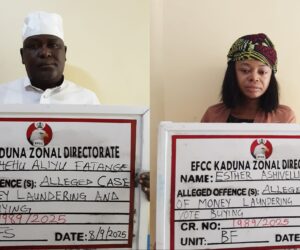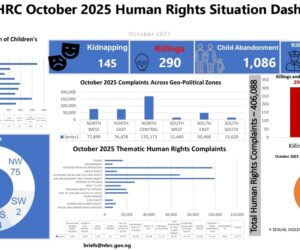The Speaker of the House of Representatives, Abbas Tajudeen, has said the federal government is advancing plans for the Diaspora Voting Bill, to grant Nigerians living abroad the constitutional right to participate in national elections.
Mr Tajudeen made this known on Monday while declaring open the First Nigerian Stakeholders’ Engagement on Diaspora Governance (NiSEDiG 2025) and the launch of the Nigerians in Diaspora Response (NiDRes) App and Website in Abuja.
The event was organised by the House Committee on Diaspora in collaboration with the Nigerians in Diaspora Commission (NiDCOM).
Represented by Patrick Umoh (APC, Akwa Ibom), the speaker described the development as “a major step towards extending democratic participation to all citizens and ensuring that every Nigerian voice is heard in nation-building.”
He said the 10th House regards diaspora engagement as a national priority, consistent with its legislative agenda of inclusion, accountability, and economic reforms.
“The House of Representatives recognises the vital and irreplaceable role Nigerians abroad play in building the nation’s image and sustaining its economy,” Mr Tajudeen said. “Beyond remittances, their involvement in innovation, trade, diplomacy, and humanitarian causes has reinforced Nigeria’s reputation as a contributor to global development.”
Long road to diaspora voting
Diaspora voting has been a recurring issue in Nigeria’s democratic discourse for nearly two decades.
The idea gained national attention during the administration of former President Olusegun Obasanjo in 2005, when a constitutional amendment was first proposed to allow Nigerians abroad to participate in presidential and parliamentary elections.
However, multiple attempts since then have failed at the constitution review stage largely due to concerns about logistics, funding, and the credibility of overseas voting.
The 9th National Assembly rejected a bill to amend section 77(2) of the 1999 Constitution, which would have allowed Nigerians outside the country to vote, citing fears that the Independent National Electoral Commission (INEC) lacked the capacity to manage the process securely.
Globally, over 115 countries currently permit some form of out-of-country voting, including Ghana, South Africa, Kenya, and several other African nations. Nigeria, with an estimated 17 million citizens living abroad, remains an outlier in not extending voting rights to its diaspora population.
The 10th National Assembly is now seeking to revive the process, with renewed support from INEC, the Ministry of Foreign Affairs, and NiDCOM.
Push for diaspora voting
Although previous attempts failed at the Constitution Review stage, Mr Tajudeen said legislative efforts are ongoing to simplify procedures and legal frameworks to make it a reality.
He said the House is working closely with relevant committees and the INEC to lay the groundwork for a credible and transparent system that would enable eligible Nigerians in the diaspora to vote in future general elections.
NiDCOM Chairperson, Abike Dabiri-Erewa, affirmed the readiness of the Commission to support the legislative process.
She revealed that a data portal has already been opened to streamline diaspora registration and ensure only verified residents abroad participate.
“We want to ensure that beyond remittances are a catalyst for holistic growth in Nigeria. We are talking about 17 million Nigerians in the diaspora,” Mrs Dabiri-Erewa said.
NiDRes App
One of the highlights of the event was the launch of the Nigerians in Diaspora Response (NiDRes) App and website, a digital platform designed to address long-standing communication barriers between the Nigerian government and its citizens abroad.
Chairperson of the House Committee on Diaspora, Tochukwu Okere (LP, Imo), said the innovation marks a turning point on how the government engages, protects, and responds to the needs of Nigerians living overseas.
According to him, the NiDRes App provides real-time emergency support, case tracking, and verified access to consular services. It also includes embassy directories, legal aid, volunteering opportunities, and investment boards for vetted projects.
He said, “It offers exciting features like: Real-time reporting of incidents and a helpdesk for emergencies, consular needs, or welfare issues. Clear tracking of cases, with timelines for updates and resolutions, visible to users, agencies, and missions. Secure profiles that verify identities, allow controlled data sharing, and prioritise privacy from the start.”
The NiDRes initiative, he explained, is part of the broader NiSEDiG 2025 strategy, a coordinated national framework that brings together laws, institutions, and digital tools to improve diaspora governance and development planning.
Diaspora’s role in national development
Mrs Dabiri-Erewa, in her keynote address, highlighted the remarkable contributions of Nigerians in the diaspora to national growth.
Since the establishment of NiDCOM six years ago, she said the Nigeria–Diaspora relationship has advanced significantly in health, education, agriculture, ICT, and volunteerism.
She noted that diaspora remittances remain the nation’s largest source of foreign exchange, peaking at US$23.81 billion in 2019, about six per cent of Nigeria’s GDP.
The NiDCOM boss also outlined several signature initiatives led by the Commission, including; National Diaspora Day (25 July), to celebrate contributions of Nigerians abroad; Nigeria Diaspora Investment Summit (NDIS), linking diaspora investors with local opportunities; National Town Hall Meetings, held during presidential visits abroad; and National Diaspora Merit Awards and Quarterly Lecture Series, spotlighting excellence and policy engagement.
She added that the National Diaspora Policy, approved by the Federal Executive Council (FEC) on 28 April 2021, provides the legal and institutional framework for harnessing diaspora potential.
However, Mrs Dabiri-Erewa identified persistent challenges, including inadequate funding, lack of suitable office accommodation, and the need to amend the NiDCOM Act to establish a sustainable financing mechanism, possibly through a small percentage of remittance charges.
READ ALSO: Reps move to strengthen EFCC’s independence, accountability framework
Collaborative governance and next steps
Speaker Tajudeen reaffirmed the House’s commitment to strengthening collaboration with the Executive through NiDCOM and other relevant agencies to protect the welfare of citizens abroad.
He said the 10th House is reinforcing legislative efforts to simplify consular, immigration, and documentation procedures, while removing bureaucratic bottlenecks that frustrate Nigerians in foreign missions.
Stakeholders at the event included representatives from Nigerians in Diaspora Organisations (NIDO), academia, youth and student groups, the Nigerian Immigration Service, MDAs, and state diaspora focal officers.
Participants made far-reaching suggestions on diaspora voting, policy harmonisation, and executive–legislative collaboration.









